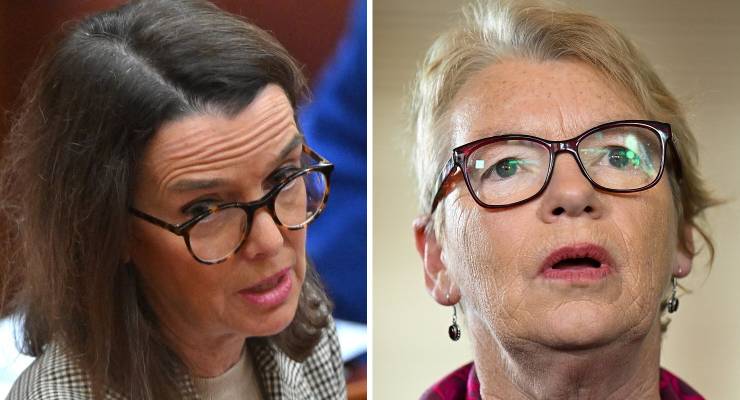
This week the Greens and the Coalition had a common goal: to amend a Labor welfare bill so that recipients could earn twice as much — $300, instead of $150 — in a fortnight without their JobSeeker payments being affected.
Both sides put up amendments that would have done so, and with their combined Senate 42 votes, they would have been able to easily beat the government’s 26 votes. Yet neither side would allow the other’s amendment to pass.
The Greens framed their proposal as part of a progressive agenda that would ideally also have included much higher JobSeeker payments. They said they were unable to support Liberal Senator Anne Ruston’s amendment because it had a cut in JobSeeker payments baked in.
The Liberal amendment, which was the subject of a story in The Australian on Monday headlined “Albanese, Dutton declare war over long-term jobless”, would have reversed a $40-a-fortnight rise in the payments announced by the government in its May budget.
“What has been Greens policy for a very long time, as well as increasing the rate of income support above the poverty line, is to allow jobseekers to earn more,” Greens Senator Janet Rice told the Senate. “It’s not a case of one or the other, which is the appalling and cruel position that the opposition is proposing.”
The Coalition, meanwhile, said it wouldn’t support the Greens amendment because the opposition’s version was “superior”.
Ruston told the chamber: “[The Greens proposal] does not recognise the nuance that’s already in our system to incentivise different people on different payments in different ways and recognise their particular circumstances.
“We philosophically believe that increasing the income-free area and taking away the barriers for people to actually enter the workforce … is a much more effective way of getting people back into the workforce than merely increasing payments.”
Both sides ended up voting against the other’s amendment, and both amendments were defeated.
When Crikey spoke to Rice ahead of the vote, she clarified that the Greens would have opposed the Coalition amendment even if the other side had agreed to split it off so that it wasn’t paired with the cut to JobSeeker payments.
She said the Greens’ opposition to the Coalition amendment had nothing to do with denying the other side a victory. Rather it was about avoiding “reinforcing [the Liberal] agenda”. In Rice’s view, those are not the same thing.
“It would have reinforced an agenda and a narrative that people who are living on JobSeeker shouldn’t get more money,” she said. “If it got back down to the House as a Liberal amendment, that would have been the agenda we’ll be running with. Whereas if it came down to the house as a Greens amendment, it would be saying, ‘This is a measure that would be helping people on income support to lift them out of poverty.’ ”
The government opposed both amendments and thanks to the battlelines drawn up between the Coalition and the Greens, there was never a risk Labor would have had to deal with either of the proposals in the House of Representatives.
Either way, the Greens had vowed not to block the government’s efforts to increase JobSeeker payments, despite believing $40 a fortnight is “woefully inadequate”.
“We will definitely not stand in the way of these efforts, but we know that it’s not enough,” acting party leader Mehreen Faruqi said earlier in the week.
That means the Greens would have had no leverage to fight the government over the threshold increase, even if it had passed the Senate and caused a debate in the house.
At least none of the parties allowed their opponents a victory. The question is, did anyone win, or did everyone lose?








Of course the Greens would no supported a Coalition amendment that meant a cut to JobSeeker payments. That shouldn’t even be controversial.
This and other articles in recent times make me wonder if Crikey has some sort of Labor affiliation. Left-leaning politics I don’t mind, but partisanship I do.
The real story here is that the party of Robodebt is STILL trying to push the “dole-bludger” line, showing they have no shame, no conscience, no heart, and they think the electorate are all amnesiac morons. I can’t wait for criminal charges. There should be many, if this were a just world.
“HOME TRUTHS
More than 1600 Australians become homeless every month amid our housing crisis, according to Homelessness Australia… Women and children make up 74% of that figure. CEO Kate Colvin says there’s a funding shortfall of more than $450 million for the sector.”
super profits tax now or vote progressive independant or a Green in to save our sovereinty- OUR democracy
With respect I think the premise of your article is incorrect.
The purpose of the LNP amendment was to cancel the $40 increase in the Jobseeker payment and used an increase in the earning threshold to justify the cancellation of the payment increase.
The purpose of the Greens amendment was to increase the Jobseeker payment by more than $40 AND in addition allow Jobseeker recipients to earn more money before being impacted by the income threshold.
Increasing the income threshold was not the main purpose of either proposed amendment.
the article lije tge media and ignorant abounds what about the money we all are paying out to the lobbied middle nen jobs providers trsining for indentured labor – chatmers ill fitted productivity solution to line middle men profiteers aka the mo of neo cons everywhere in both labor and libs – the scams under dumb proletariat noses
Not happy with the binary biased headline for starters …
so true
news alert Dunce ton if i could earn 150 bucks i would not be on a abuse of my rights to dignity and ethical treatment the system ininhumane and no one chooses this abuse – Morrson et al designed indentured dickensian workhouses to line middle men with no skills themselves who can only live by marketing parasitic so called business sell off of freedoms by indenturing and hobbling agency and rights